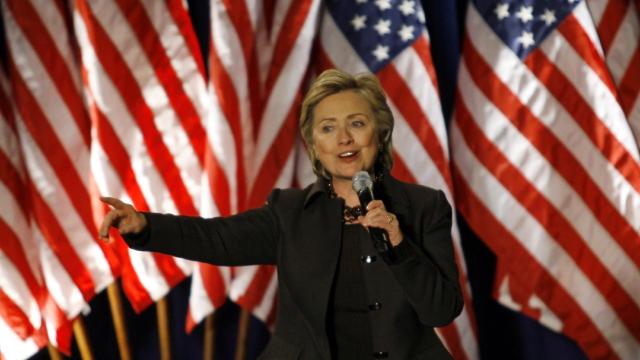Anne-Marie Slaughter 'This Country Is Ready for a Woman in the White House'
Anne-Marie Slaughter was one of Hillary Clinton's top advisors at the State Department before she left politics to devote more time to her family. In an interview with SPIEGEL, she discusses the feminist debate that ensued and her views of the Syrian crisis.
Author and foreign policy expert Anne-Marie Slaughter is one of the few people who can speak authoritatively on the compatibility of family and career for women, on Hillary Clinton as a presidential candidate and on the situation in Syria.
Now 57, Slaughter served as director of policy planning at the US State Department under Secretary of State Clinton from 2009 to 2011. Prior to that, she was the first female dean of the Woodrow Wilson School of Public and International Affairs at Princeton University. In the summer of 2012, she published an article in the monthly magazine The Atlantic called "Why Women Still Can't Have It All." In the article, she explained why she brought her political career in Washington D.C. to an end out of consideration for her two teenage sons. The article triggered a fresh debate on feminism and was read over a million times within just a few days. Now, Slaughter is director of the New America Foundation, a Washington-based think tank.
The German version of her most recent work, "Unfinished Business: Women, Men, Work, Family" (Verlag Kiepenheuer & Witsch, Cologne; 352 pages; €19.99), has just hit the bookshelves in Germany.
SPIEGEL: Ms. Slaughter, you were the first woman to be named director of policy planning at the State Department. Now, though, most know you as the woman who said women can't have it all. How do you feel when you hear that?
Slaughter: I recently said that this is the moment I just want to shoot myself. That was a little strong, but accurate.
SPIEGEL: You regret having written the article?
Slaughter: No, because it's a conversation we need to have. And it is quite possible that it's the most important thing I will have done in my life. In foreign policy, even if you hold high office, you can't be sure what the effects will be of the things you do. The article, on the other hand, is something that has touched the lives of hundreds of thousands of women and I am glad to have started the debate. Because it will change things.
SPIEGEL: You came under a lot of criticism. Feminists accused you of betrayal for leaving your State Department job on account of your children.
Slaughter: Yes, and others, especially in Europe, tried to use my case for their cause. They said, finally a woman who is honest enough to say that a mother needs to be home with her kids. But that is not at all my point. It's definitely not the idea of Mutti, you know, the essential mother, not at all. I mean, my husband has spent more time with our children than I have. I don't think they're better or worse off.
SPIEGEL: So what was your point?
Slaughter: Not to lie anymore but to admit that reality is often much more complicated than you can plan it. It was interesting that feminists of my generation told me: You are discouraging younger women; you are confirming stereotypes of women; you are opening a door, initiating a debate, that will harm our movement. And my point was: We are already having this debate, especially in the younger generation.
SPIEGEL: Facebook executive Sheryl Sandberg has offered an alternative narrative. She argues that, if you try hard enough, it is possible to combine career and family.
Slaughter: We all love narratives where we're the captain of our boat, and Americans love them more than anybody else. We are a nation that believes: "You can make it happen." I very much admire Sheryl Sandberg for what she has done. I really do. But Sandberg's narrative also implies: "Well, it's your fault if you couldn't make it." There is a certain injustice in that. The American work environment has to change, not the women. We should be recognizing that what women are not fitting into is a very narrow, male-dominated workplace of the 1950s.
SPIEGEL: In addition to the well-known concept of the glass ceiling, your new book introduces the concept of a "maternal wall."
Slaughter: Yes, because motherhood is now a greater predictor of wage inequality than gender is. It's enormous. When we talk about gender pay gaps in the United States, and if you look at women without children, they earn 96 cents for every dollar that a man is earning, while for mothers it is about 76 cents. That's nearly 25 percent less. For single mothers, the situation is even worse. One third of them are living in poverty or just on the edge of poverty. This is an unacceptable situation.
SPIEGEL: You have quoted other frightening numbers as well. Women hold less than 15 percent of executive positions in the US but 62 percent of minimum wage jobs. How can this situation be overcome?
Slaughter: I have two prescriptions. First, the government has to value care and to build up an infrastructure of support. Second, we have to change the role of men. I think of this as a gender revolution. We should value if men or women want to take a certain time for their young children.
SPIEGEL: American laws allow women only a few weeks of unpaid leave after giving birth. But you have also criticized Germany's much more generous approach. Why is that?
Slaughter: The European problem is that it assumes that the minute a woman has a child, the mother identity subsumes the professional identity. Now she's the mother, above all, and we must give her all this time. So the German system takes care of the mother, but it's not modern. It is once again a question of a gender revolution. Biological sex should not determine what we are capable of, what we aspire to, what we do in our life.
SPIEGEL: American feminists like Gloria Steinem demanded the same thing back in the 1970s. Recently, she also criticized young women for supporting Bernie Sanders for the Democratic nomination instead of Hillary Clinton -- as though they weren't entitled to have their own opinions.
Slaughter: I think it was really a mistake to shake her finger at younger women. I was horrified when I heard about that. You don't get to control the revolution. We can't expect that these young women behave like we would behave. What I would say to them is: Do not vote for Hillary because she is a woman. Ask yourself, who has done more for women so far and who will do more for women in the future -- and then make your choice.
SPIEGEL: It's interesting. Hillary has a lot of support among Hispanics and among African Americans. But she has had difficulties attracting young white women. Why is that?

Democratic presidential candidate Hillary Clinton: "Hillary Clinton does not stand for revolution."
SPIEGEL: Are you sure there will be sexist attacks?
Slaughter: Oh, yes definitely. I am convinced that this country is ready to have a woman in the White House, but I also think there's still a lot of hidden sexism. In other words, I think an awful lot of the reasons people put forward for not liking Hillary Clinton play into deep-seated, negative female stereotypes: ambition, secrecy, calculating. I mean, that is Lady Macbeth, a kind of cold woman. I don't think that's Hillary. And I don't think people would judge a man in the same way.
SPIEGEL: So you believe that a female candidate still has a more difficult path than a male candidate does?
Slaughter: No question. I mean, in 2008, she had to prove she was tough. Now she has to prove she's caring. At least they're paying less attention to what she looks like this time. But her age is an issue. Bernie Sanders is older and Donald Trump is her age. I mean, it's ridiculous. There are still plenty of double standards. But that said, I think I can imagine a woman being inaugurated in a way that I could not have probably 10 years ago.
SPIEGEL: You worked very closely with Hillary Clinton for two years. To bring up an additional cliché, did she lead the State Department in a different way than a man would have done?
Slaughter: Absolutely. The most evident example was that she started our first meetings only at 8:15 a.m. By Washington standards, that's incredibly late. Most cabinet members have their first meeting at 7:00 a.m., which means you have to be there at 6:00 or 6:30 to prepare. She deliberately did not do that because she had people on her staff who had to get their kids to school. She set a tone for other people in the State Department.
SPIEGEL: Why is it so difficult for her to show her warm and caring side during the campaign?
Slaughter: I think she's a person who is happier getting things done than telling people why they should vote for her. She does not love telling everybody why she is so great. She is a hard worker, very efficient in meetings, very results orientated. When you're in meetings with her, it's like: "Let's not just sit around and talk. What can we do?" When she was secretary of state, her staff loved her because she was out there doing something.
SPIEGEL: When the civil war in Syria began, Hillary Clinton and you were in favor of a more interventionist foreign policy than the path chosen by President Barack Obama. Would the world today be a different one if your advice had been followed?
Slaughter: I do think the Obama administration bears a lot of responsibility for what is happening in Syria. I mean, you can never say for sure what would have happened. But in the winter of 2012, I wrote an op-ed in the New York Times saying we needed to create safe zones. That was four years ago. There were plenty of people who said if we don't protect the Syrian people, Assad will stop at nothing. He will destroy the country. People predicted that extremism would rise if we didn't support the moderates. You know, all of that was predicted at the time, and what did we do? We went to the UN and we got vetoed by Russia.
SPIEGEL: What should have been done instead?

Homs, Syria: "When he crossed the famous red line and used chemical weapons without a doubt, we should have reacted to that."
SPIEGEL: Why did Obama choose not to intervene?
Slaughter: It was risk aversion. It was: "We don't know how it will end, and so we are not going to start." I think the Obama administration has done many great things in foreign policy. I really do. The Iran deal is hugely important. Opening to Cuba is hugely important. They've done a lot of things right. And my point is not that we should have sent troops in on the ground and taken over Syria. Absolutely not. But did that mean we couldn't have bombed Assad's air force? I think we would have forced them to the negotiating table. The consequence is now, as far as I can see, a region that may be in this kind of conflict for five or 10 more years.
SPIEGEL: Do you still believe that there might be a diplomatic solution?
Slaughte r: I think it has to be diplomatic. I mean, there is no military settlement in sight. Although, I still today would say you have to stand up and make clear that Assad can fight in legitimate ways and barrel bombs are not legitimate. I would just say: "If you do this again, we will take out your air force."
SPIEGEL: You mean attacking the Syrian air force?
Slaughter: Yes.
SPIEGEL: And then you would immediately find yourself in an armed conflict with Russia. Aren't you concerned about such an eventuality?
Slaughter: I'm a child of the Cold War. You do not say, "Oh, my God, there are Russian planes, so I'm going to cede the field." I mean, what kind of world would we have had if the United States had done that for 60 years? No. You stare them down, and you say: "This is not acceptable." And to Russia, you say: "You can be the ally of the government, but this government is massacring its people. These are crimes against humanity, and we are not going to allow them."
SPIEGEL: Does that mean you do not believe in the Geneva peace talks initiated by Secretary of State John Kerry?
Slaughter: I am not inside the game enough to be able to judge. My understanding is that Kerry is signaling that you've got to be ready to compromise because we can't get you everything you want. But I hope he's telling the Russians the same thing. We can't just give in to Assad. If you have a settlement that is too favorable to Assad, it just won't hold.
SPIEGEL: What about supporting the rebels? Is such a thing still plausible?
Slaughter: The question is: What is the lesser evil? I'm sure that anybody we would support against Assad is probably not somebody we would want to be supporting the day after. I'd rather use force to get Assad to the negotiating table than support people where we don't know where those arms are going to go.
SPIEGEL: Republican presidential candidate Donald Trump is convinced that there is a much quicker way to solve the problem. He has promised to "bomb the hell out of" Islamic State should he become president. Do such claims concern you?
Slaughter: I don't honestly think we know what Trump would do. We have no idea who he truly is. He is an entertainer, and he is a dealmaker. He is a professional public figure. I think I have a sense of what Cruz would do, of what Rubio would do. But I have no idea what Trump would actually do. But I think he would quickly find out that it is very hard to bomb ISIS (out of existence). It's not like we haven't tried bombing.
SPIEGEL: If Hillary Clinton should become president, what could women expect from her? What kind of cabinet would she form?
Slaughter: She would break plenty of glass ceilings. She would hire women for her administration, but not only. She is very attentive to gay and lesbian issues, to minority issues of all kinds. So she would have a very diverse cabinet and she would put women in jobs that women have not yet held. There is Defense, there is the Treasury. There are big jobs that we have not yet seen a woman hold, and she would certainly change this.
SPIEGEL: Would you consider going back to government?
Slaughter: Sure, at some point. I mean, I'm really happy at what I'm doing at the moment. But why not think about it? My younger son has only got another year and a half until he finishes school.
SPIEGEL: Ms. Slaughter, we thank you very much for this interview.











